The program does not stress one particular genre or style, but allows students to pursue their own interests which have included: narrative, experimental, animation, and documentary.


DIGITAL CINEMA



The Digital Cinema major at NMU
The School of Art and Design's B.F.A. in Digital Cinema includes 20 credit hours of digital cinema courses, while the B.A. and B.S. degrees require 16 credit hours, with the option to pursue a minor.
Courses explore various aspects of digital cinema, including history, theory, and production. Upper-level courses emphasize individual filmmaking, requiring students to develop proficiency across multiple production skills rather than specializing in a single area such as editing, cinematography, or directing. The program encourages exploration across genres and styles, including narrative, experimental, and documentary filmmaking.
All projects are produced in digital video using professional equipment and facilities. Resources include 4K+ cameras, professional sound and lighting equipment, a Mac Pro editing studio, a DaVinci color studio, and a chromakey/lighting studio. Studios are supervised and accessible for over 80 hours a week. Students also use their University-issued MacBook Pros for post-production work.
Beyond an initial investment in media storage, students typically spend less than $100 per semester on course supplies, depending on project scope.
Graduates have pursued careers in feature film and television production, marketing and advertising, broadcasting, event documentation, education, and independent filmmaking.
The Digital Cinema Majors Utilize Multiple Video Formats to Explore Many Types of Communication
Click to Learn MoreDigital Cinema Studio
Digital Cinema students complete coursework using their University-issued MacBook Pros and the shared Art & Design Computer Studio. The studio is equipped with Apple computers featuring large 27” displays and industry-standard software, including Adobe Premiere Pro, Adobe After Effects, DaVinci Resolve, and Final Cut Pro X.
Students enrolled in Digital Cinema courses can borrow equipment from the School of Art & Design. This includes cameras, lenses, rigging gear, as well as sound and lighting equipment. Advanced students also gain access to higher-end gear, such as the Blackmagic URSA cameras. Students may also work in the Digital Lighting Studio, which features a Kinoflow lighting system and three stages—including a chromakey (green screen) stage. Additionally, students have access to the newly upgraded Color Suite, which includes DaVinci Resolve and a professional Blackmagic Color Panel for industry-standard color grading. Studios and equipment checkout are available to students for approximately 75 hours per week outside of scheduled class times. The program also makes use of a state-of-the-art, theater-style classroom for lectures, film screenings, and student critiques.
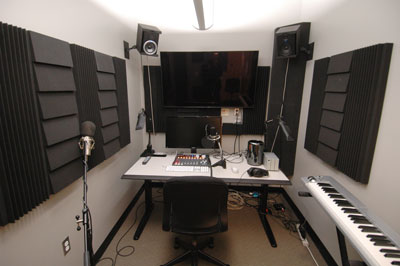


The Digital Cinema Studio is Equipped with a Wide Range of Software and High End Workstations
Click to Learn MoreDigital Cinema Faculty
click to open/close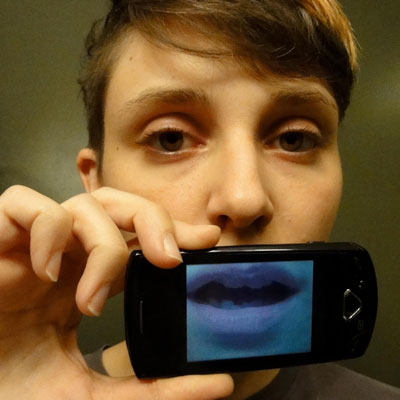
Gabrielle McNally
Associate Professor
BA Luther College
MFA University of Iowa
A practicing artist, Gabrielle McNally works in experimental autobiographical and essayistic nonfiction exploring the notions of documentation, family history, genealogy, inherited memory, place, fragmentation, ritual, and performance. Gabrielle executes all aspects of her works including the conception, cinematography, editing, sound design, and musical composition. Gabrielle graduated with an MFA in Film and Video Production in 2014 from University of Iowa. In her time at Iowa, she also completed certification in Gender, Women’s, and Sexuality Studies. Gabrielle collaborated on feature films in Iowa before attending graduate school. She received her B.A. in with honors in art from Luther College in Decorah, Iowa in 2009 focusing her work on video, performance, and installation. She also studied vocal music performance, theatre, and dance, participating extensively in all three. She continues to include these techniques in her video work. Her personal work has screened internationally at several film festivals and galleries.
WEBSITE
gabriellemcnally.com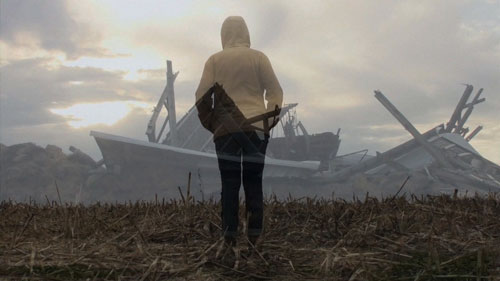
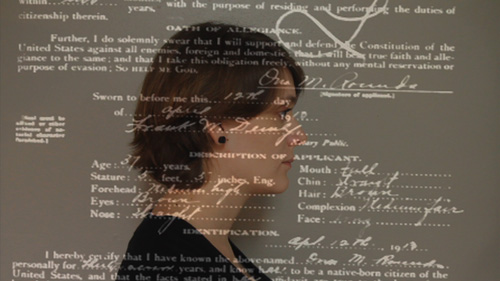
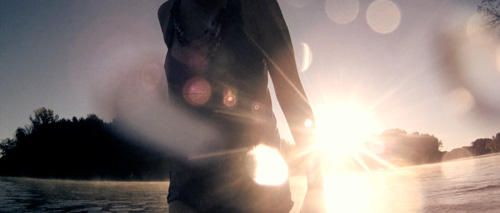
Digital Cinema Courses
click to open/closeAD 212 Digital Cinema: Foundations
4 credit hours
Offered: Fall, Winter
Introduction to the concepts and practices of digital filmmaking exploring fiction, documentary, and experimental video production. Focuses on foundational approaches to filming and editing short-form cinematic works.
AD 312 Digital Cinema: Advanced Production
4 credit hours
Offered: Winter
Prerequisite: AD 212 or BC 250, or instructor permission.
Development of the concepts and practices of digital filmmaking exploring fiction, documentary, and experimental video production. Focuses on advanced approaches to filming and editing short-form cinematic works emphasizing cinematography, post-production, and collaboration.
AD 448A Digital Cinema: Documentary Filmmaking
4 credit hours
Offered: Fall, odd-numbered years
Prerequisite: AD 312 or instructor permission.
Continued development of the concepts and practices of digital filmmaking emphasizing documentary film production. Focuses on producing short-form cinematic works exploring various documentary modes, historical approaches, and ethics of representation.
AD 448B Digital Cinema: Fiction Filmmaking
4 credit hours
Offered: Fall, even numbered years
Prerequisite: AD 312 or instructor permission.
Continued development of the concepts and practices of digital filmmaking emphasizing fiction film production. Focuses on producing short-form cinematic works exploring narrative structure, character development, and visual storytelling.
AD 449 Digital Cinema: Professional Practice
4 credit hours
Offered: Winter
Prerequisite: AD 303 and either AD 448A or 448B, or instructor permission.
Continued development of the concepts and practices of digital filmmaking emphasizing the development, production, and realization of a capstone project. Focuses on professional production practices and career development.
Digital Cinema FAQ
click to open/closeWhat is the difference between a Bachelor of Fine Arts in Digital Cinema and a Bachelor of Arts or Bachelor of Science?
The Bachelor of Fine Arts (BFA) in Digital Cinema is a professional studio degree designed for students seeking intensive, hands-on training in filmmaking. It includes specific coursework in related studio areas like Graphic Design, Photography, and Electronic Art & Animation. BFA students also take classes in Media Production, Film Studies, and Theatre & Dance. This path is ideal for students planning careers in the creative industries, such as directing, editing, or cinematography.
The Bachelor of Arts (BA) and Bachelor of Science (BS) offer more flexibility, making them a great choice for transfer students or those wanting to combine Digital Cinema with another area of study. These degrees allow room for a minor (e.g., Music, Creative Writing, or Business). The BA includes a world language requirement, while the BS does not.
Does the School require a portfolio review before you are accepted into our programs?
If you are accepted into the University, you can pursue a degree within the School. Although there is no required portfolio review to enter the program, Art and Design majors must participate and complete a faculty review of their portfolios (AD303: Individual Art Review). This review occurs after students have completed the required prerequisites in foundation courses and at least three Digital Cinema courses.
Are there scholarships for incoming Art and Design majors at the Freshman level?
The School of Art & Design offers the High School Freshman Scholarship (four $1000 awards) that is available each year with applications due in April. Scholarship Information
What equipment is required for Digital Cinema majors?
Digital Cinema majors are not required to own personal filmmaking equipment. All projects are completed using professional gear and facilities provided by the School of Art & Design. Each Art & Design major receives an Apple MacBook with Adobe Creative Suite, allowing them to edit projects on their laptops. Students enrolled in Digital Cinema courses have access to a wide range of production equipment–including digital cinema cameras, lenses, rigging gear, lighting, and professional sound equipment–through the School’s equipment checkout system. Advanced students gain access to higher-end tools, such as the Blackmagic URSA camera systems.
Students also benefit from access to:
- A state-of-the-art lighting studio with a chromakey (green screen) stage
- Post-production suites with high-end computers and industry-standard software for editing, color grading, and visual effects
Aside from an initial investment in personal media storage, most students spend under $100 per semester on course supplies, depending on the scope of their projects.
What are the prospects for employment with a degree in Digital Cinema?
A degree in Digital Cinema prepares students for a wide range of careers in the film, television, and media industries. Graduates may pursue roles such as director, cinematographer, editor, screenwriter, sound designer, or producer. Many also find work in related fields like advertising, marketing, social media content creation, and education.
While the film industry is competitive, students gain hands-on experience, build strong portfolios, and graduate with a network of collaborators and alumni. The curriculum emphasizes storytelling, creative problem-solving, and visual communication skills that are highly valued across many creative and tech-forward industries.
In their final year, students take AD499: Professional Practice, a course focused on career development and capstone projects, helping them transition confidently into the professional world.
What emphasis will I find in the Digital Cinema program?
The Digital Cinema program emphasizes conceptual clarity, storytelling, and collaboration at every stage of the filmmaking process. Students are encouraged to develop original, meaningful ideas and bring them to life using strong visual and narrative techniques. While technical skills are essential, the core focus is always on producing intentional, understandable, and impactful work.
The curriculum offers a comprehensive filmmaking experience, including:
- Pre-production: storyboarding, screenwriting, art direction
- Production: directing, cinematography, sound design, collaboration
- Post-production: editing, sound mixing, color grading, visual effects
Courses such as AD212 (Foundations) and AD312 (Advanced Production) build foundational and intermediate skills. In the 400-level courses (AD448A and AD448B), students explore both documentary and fiction filmmaking, leading to a capstone project and professional development in AD499: Professional Practice.
Do most of your majors find employment?
Yes. The majority of students who pursue careers in Digital Cinema find success in areas such as feature film and television production, marketing and advertising, broadcasting, event documentation, education, and independent filmmaking. Graduates work across the U.S., from Los Angeles to New York City, and some go on to pursue graduate studies.
Internship opportunities in Marquette are growing, and completing an internship before graduation increases employment prospects. Students are also encouraged to join the 4Reels Digital Cinema Club to expand their professional network.
Advanced courses help students develop resumes, reels, and portfolio websites, ensuring they’re prepared to begin the job search before graduation.
May I enroll in other Art and Design classes?
Yes, the Digital Cinema curriculum includes Art and Design elective credits, giving you flexibility to explore other creative areas. All 200-level studio courses are open to any student and require no prerequisites.
Be sure to consult with your advisor or faculty mentor to select electives that align with your interests and academic goals.
More Questions? Please email Professor Gabrielle McNally gmcnally@nmu.edu
















 NMU is an
NMU is an 



